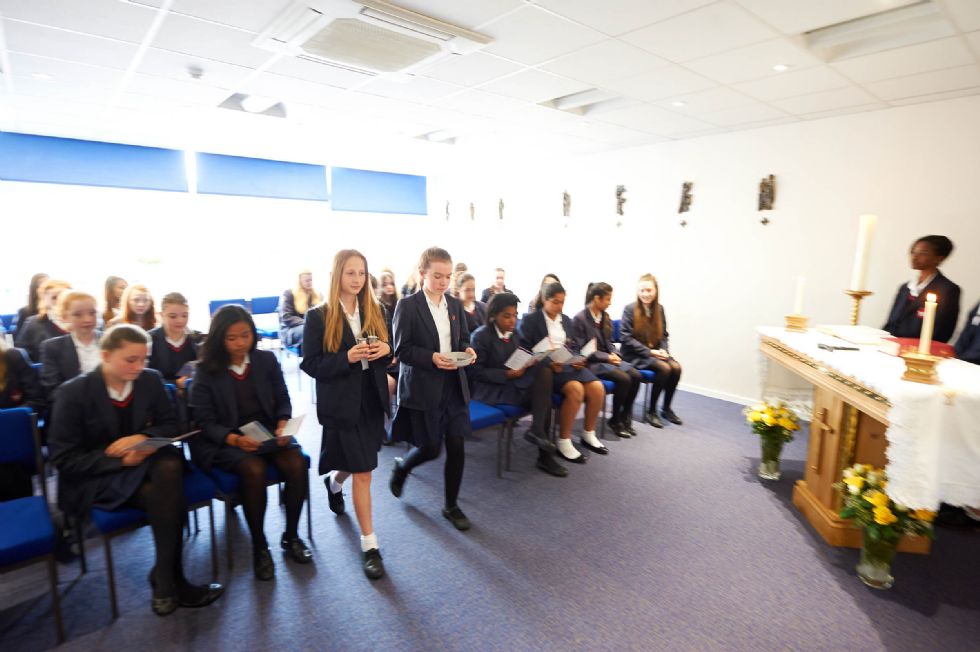Drama
Curriculum Statement – Drama
“Confident in God’s love for us, we commit ourselves to his service”
Vision:
The vision of the Drama department is to encourage students to develop a passion for Theatre, Drama and Performance. Drama gives all students a chance to develop culturally, emotionally, intellectually, socially, spiritually and allowing them to express and accept the opinions of others. We believe Drama lessons can play a key role in such development as during the schemes of work the students play out different identities and personalities. They learn about themselves and the world in which they live. It is a vibrant part of the curriculum that sits comfortably alongside English. Through the carefully designed curriculum and programmes of study students develop an understanding theory and practical side of Theatre and Drama. At the same time students are developing essential transferable life skills such as: empathy, co-operation, creativity and confidence.
Aims:
Drama plays a special part of the KS3 Curriculum. Through Drama students learn
- to speak fluently so that they can communicate their ideas and emotions to others o to communicate in a sophisticated way.
- to listen as an audience and become a part of a cultural event.
We believe that oracy skills are vital for all students to be able to access the curriculum. In Drama we actively teach students how to use their voices in a wide range of meaningful ways. We show them how to use a range of different discourses. They learn how to use pitch, tone and volume to add texture to their voices. Above all they learn how to hear their own voice, feel empowered by the sound they can make. They learn to see the potency of their voice for their audiences. To fully equip our students, we teach them how to decode the vocabulary needed to excel in Drama. We also work on their literacy skills in reading and writing about drama. All the skills of language are essential to participating fully as a member of society; students, therefore, who do not learn to confidently speak, listen and perform are effectively disenfranchised.
Implementation:
All KS3 students have a lesson of Drama each week. The lessons are carried out in the Drama studio. In this space they learn about the power of performance and how to be a supportive audience member. In year 7 the students start to learn how to perform as a group. They work on modernising fairy tales, adapt extracts of Charles Dickens for the stage, prepare mini melodramas and learn how to write their own plays about real life situations. The course is designed to encourage students to discover their creative voice at the same time as learning how to work collaboratively with others. At the end of all schemes of work the students write up evaluations of their own performance and assess how well their thoughts and ideas were realised on the stage. It is this evaluation of their ideas that highlights to them the academic rigor required to achieve in Drama. Their written work demystifies the creative process all playwrights and screenplay writers work through in the creative process.
In year 8 the students learn about the history of the theatre from the ancient Greeks to the modern times. There is also a new added focus on the conventions of theatrical design. They work on scripts and screenplays from Roald Dahl's magical books and weave their own stories. This year actively encourages the girls to explore the craft behind great shows and performances.
Year 9 starts with a unit on "Devising". This is component 2 of the Edexcel GCSE. The unit gives the students an opportunity to see what GCSE Drama could be like and to help inform them of their option choices. After this unit students study a modern award winning adaptation of "The Curious Incident of the Dog in the Night time." They analyse how the script has been written, how the micro elements of theatrical design help enthral audiences all around the world. After this analytical work the students work on how a stage can be filled by just one voice. They work on a series of monologues.
Impact:
Students love the freedom that Drama gives them for self-expression. They find the rigor of academic analysis of scripts and screenplays very intriguing. Reading scripts that have been written by major playwrights, that have been produced on the National stage, is inspiring. Many students have shown a desire to continue Drama into GCSE. The course is oversubscribed.

